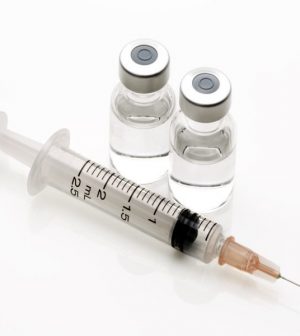- Recognizing the Signs of Hypothyroidism
- 10 Strategies to Overcome Insomnia
- Could Artificial Sweeteners Be Aging the Brain Faster?
- Techniques for Soothing Your Nervous System
- Does the Water in Your House Smell Funny? Here’s Why
- Can a Daily Dose of Apple Cider Vinegar Actually Aid Weight Loss?
- 6 Health Beverages That Can Actually Spike Your Blood Sugar
- Treatment Options for Social Anxiety Disorder
- Understanding the Connection Between Anxiety and Depression
- How Daily Prunes Can Influence Cholesterol and Inflammation
Pfizer Vaccine Is 90% Effective 3 Weeks After First Shot, Early Study Shows

Just one dose of Pfizer’s coronavirus vaccine might be enough to largely protect people from being infected with COVID-19, preliminary research shows.
The vaccine became 90% effective 21 days after the first shot in a two-dose regimen, said British researchers who looked at data from Israel, where the vaccine has been rolled out to a large portion of the population.
“A second dose of the Pfizer vaccine would normally be given 21 days or more after the first, to top up and lengthen the effect of the first dose,” explained lead researcher Paul Hunter, from the University of East Anglia’s Norwich Medical School.
“But here in the U.K., the decision was made to delay the timing of the second injection until 12 weeks after the first,” Hunter said in a university news release.
“The logic behind this is to protect more people sooner and so reduce the total number of severe infections, hospitalizations and deaths,” Hunter explained. “But this decision caused criticism from some quarters, due in part to a belief that a single injection may not give adequate immunity.”
Hunter noted that an earlier study, which has not been peer-reviewed, reported that a single shot of the Pfizer vaccine might not provide sufficient protection.
“But we saw a number of flaws in how they looked at the data, including the fact that they did not attempt to estimate the effectiveness of the vaccine from day 18 onwards,” Hunter said. “This would have given a better indication of how effective a single dose of the vaccine could be if the second dose was delayed by up to 12 weeks.”
So, Hunter’s team tried to estimate the effectiveness of the Pfizer vaccine after a single dose by taking a closer look at the real-world outcomes in Israel.
What did they discover? According to the study, published Wednesday on the preprint server, medRxiv, and yet to be peer-reviewed, case numbers increased for eight days, before declining to low levels by day 21.
“We found that the vaccine effectiveness was still pretty much zero until about 14 days after people were vaccinated,” Hunter said. After day 14, immunity rose gradually — to about 90% at day 21 — and then plateaued. All the improvement in protection was seen before any second injection was given.
“This shows that a single dose of vaccine is highly protective, although it can take up to 21 days to achieve this,” Hunter said. “Whilst we do not know how long this immunity will last beyond 21 days without a second booster, we are unlikely to see any major decline during the following nine weeks.”
The study did reveal that the first eight days after the first shot were a particularly perilous time, with infections doubling before they started dropping, the researchers said.
“We don’t know why there was this initial surge in infection risk, but it may be related to people being less cautious about maintaining protective behaviors as soon as they have the injection,” Hunter suggested.
Dr. Amesh Adalja is an infectious disease expert and senior scholar at the Johns Hopkins Center for Health Security, in Baltimore. Reading over the U.K. findings, he said that “as the world faces difficulties [during] a vaccine rollout of two-dose vaccine regimens, it is very important to get data on single-dose regimens. Ideally, people should be kept to the studies doses, but that may not be the best way forward in the current context.”
Adalja noted that, beginning eight days after injection, the Pfizer vaccine appears to slowly build protection. “These finding need to be vetted further but they are promising,” he said.
A single dose of another coronavirus vaccine, this one developed by Oxford University and AstraZeneca, was also shown to be 76% effective at preventing COVID-19, according to results that have not been peer-reviewed but are awaiting publication in The Lancet medical journal.
More information
Visit the U.S. Centers for Disease Control and Prevention for more on coronavirus vaccines.
SOURCES: Amesh Adalja, MD, senior scholar, Johns Hopkins Center for Health Security, Baltimore; East Anglia University, news release, Feb. 3, 2021
Source: HealthDay
Copyright © 2026 HealthDay. All rights reserved.










